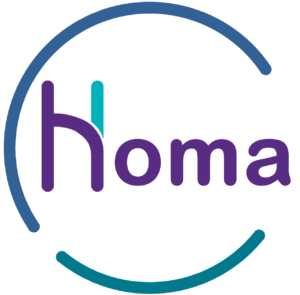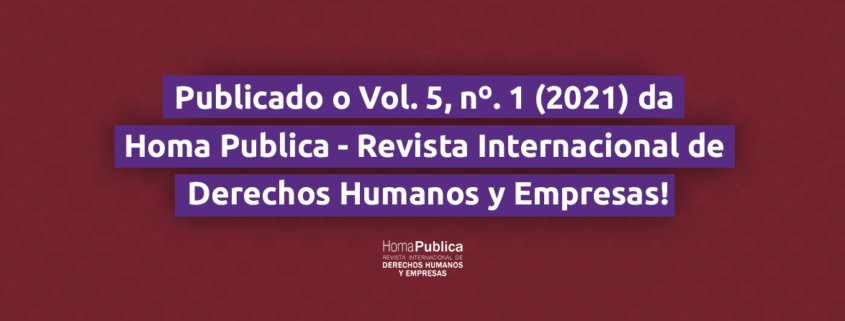The new issue of Homa Publica – Revista Internacional de Derechos Humanos y Empresas was launched
Vol. 5, No. 1 is joined by the dossier “Corporate Responsibility in light of the Inter-American System of Human Rights” organized by Prof. Berónica Narvaez Mercado.
The new issue of Homa Publica has eight articles on the subject of Corporate Responsibility in light of the Inter-American System of Human Rights, in addition to one article in its regular section. The dossier was organized by Berónica Narvaez Mercado, from the Corporación Universitaria del Caribe, Colombia. Eight of the nine published articles were written in Spanish, with authors from various Latin American countries.
The first article is entitled “Advances of the Inter-American System on Business and Human Rights: the REDESCA report”, and aims to analyze the report of the Inter-American Commission on Human Rights (IACHR) on Inter-American standards on Business and Human Rights, prepared by the Special Rapporteur for Economic, Social, Cultural and Environmental Rights (REDESCA).
The article aims to analyze the innovations that the report brought to the field of Business and Human Rights, as well as the possibility of applying these innovations to the draft of the International Treaty on Business and Human Rights.
The main conclusions of the article are that the REDESCA report brings several advances to the discussion, such as the importance of establishing direct obligations to transnational corporations and extraterritorial liability measures.
The authors of the article are Andressa Soares, João Pedro Brito Perillo and Sofia Miranda de Oliveira.
The second article is named “BIC Companies in Colombia: a light in the implementation of the Interamerican Standards in Human Rights and Business” and is authored by Paula Lancheros Sánchez and Julián Tole Martínez.
This article also seeks to discuss the impact of the REDESCA report in regard to Business and Human Rights. It brings attention to Colombia’s transnational corporations, also called “BIC companies”, which propose a break with the neoliberal paradigm, promoting a new generation of companies which report benefits to society and the environment, beyond the economic interest of their stockholders.
The third article is called “Negotiating accountability for human rights violations: the case of the Volkswagen do Brasil agreement”, and, as the name already exposes, it aims to make a critical analysis of the implications of the recent agreement signed between Volkswagen (VW) do Brasil and the Brazilian Federal Prosecution Service.
The agreement ends civil suits brought by victims of the Brazilian dictatorship, who alleged their employer’s complicity in gross human rights violations.
By analyzing the potentials and limitations of the negotiations related to the cases of corporate complicity in the case, the article concludes that compensation can not only fulfill the role of repairing the victims of human rights violations, but also acquire a relevant significance of punishment for those responsible as a guarantee of non-repetition.
The authors are Juan Pablo Bohoslavsky and Juan Cruz Goñi.
The fourth article, “Workers of the Fireworks Factory of Santo Antônio de Jesus and their families vs. Brazil: contributions to the human rights and business agenda”, the authors are Andressa Soares, Renata Paschoalim Rocha and Luca Cezário Tostes Tito.
This document aims to analyze the case which recently became unappealable before the Inter-American Court of Human Rights: Empregados da Fábrica de Fogos de Santo Antônio de Jesus e seus Familiares Vs. Brasil.
The article is structured around the factual description of the case, the main arguments brought by the Court and, finally, the general contributions of the judgment, its implications in international law, and possible implications of the judgment of the case for the Human Rights and Business agenda.
The fifth article is authored by Aline Lais Lara Sena and Manoela Carneiro Roland, general coordinator of Homa – Human Rights and Business centre. The document is called “The labor exploitation of undocumented migrants in the face of corporate logic: an analysis of the Inter-American Court of Human Rights Advisory Opinion OC 18/03” and seeks to understand the condition of vulnerable groups, especially undocumented migrants, in the face of the labor exploitation to which they are subjected in the corporate environment.
The approach of this article is due to the relevance of the theme involving the violation of human rights by transnational corporations associated with the migratory reality. The Critical Theory of Human Rights was used as a framework to analyze Advisory Opinion 18, of 2003, of the Inter-American Court of Human Rights, the first international document to specifically address the guarantee of the rights of undocumented migrants.
From this, we seek to answer whether or not the document is sufficient for the protection of undocumented migrants in the Human Rights and Business agenda, based on the hypothesis that the simple recognition of rights is not enough for its realization.
The sixth article published in Homa Publica, “Go Global China, rights and diplomacy among companies and their positioning in the Ecuadorian copper mining market”, authored by Pablo Rodríguez, Berónica Narváez Mercado and María Fernanda Noboa.
This paper analyzes the position of Chinese mining State-Owned Enterprises (SOEs) in Ecuador’s copper market in relation to the Go Global strategy, in an effort to understand the political nature of markets and the links between foreign and domestic markets within the international political economy.
Go Global is a Chinese industrial policy of globalization characterized by an aggressive insertion of its companies and businesses into the markets of outsourced countries. In the conclusion, it is understood how the effects of business-to-business diplomacy have the ability to influence not only markets, but also the political organization of host countries in regions such as Latin America.
The seventh article is called “The management of corporate responsibility in environmental laws in small and medium-sized timber companies in Barranquilla, Colombia”, and seeks to analyze the management of corporate social responsibility (CSR) in environmental law through a sample of 6 small and medium-sized companies in the timber sector in the city of Barranquilla, Colombia.
The authors of the article are Margarita Cantero Ramírez, Lorena Martínez Martínez, and José Cruz Guzmán Díaz. The results indicate that the companies are aware of the impact of the logging activity.
The last article of the dossier in this issue of Homa Publica is “The role of the State in stimulating business activity and the Mexican labor market in the face of COVID-19”. It addresses the importance of the role of the State as a stimulator of economic activity to ensure the functioning of business activity, where the company is a central actor to ensure the human right to work in the context of a pandemic.
The article considers the current uncertainty regarding job stability due to some of the changes that have occurred in labor relations and rights in the Mexican labor market in the face of the COVID-19 pandemic, for which a qualitative documentary study was conducted from a socio-legal perspective.
The authors of the last article are Adriana Uribe Uran, Hilda Estrada López, and Meylin Ortiz Torres.
The journal also features an article in its regular section, titled “The scope of the National Action Plans on Human Rights and Business implemented in the Americas in 2020”.
In this research, an analysis of the scope of the National Action Plans (NAPs) on Human Rights and Business implemented in the Americas by 2020 was conducted, describing, identifying and characterizing the existing experiences in the three selected countries of the continent (Colombia, United States and Chile).
The article, authored by Berónica Narváez Mercado, Pablo Rodríguez, and Piedad Martínez Carazo, concludes that despite the significant reach of the norms, they have no binding effect, and human rights violations continue to occur.
The articles are available for reading in Portuguese or Spanish.
Homa Publica – Revista Internacional de Derechos Humanos y Empresas is a biannual continuous publication journal in the field of “Human Rights and Business”, created by Homa – Human Rights and Business Centre of the Law School of the Federal University of Juiz de Fora.
The journal focuses on the area of Law, but is also open to relevant contributions from other fields of the Humanities.
You can access Vol. 5, No. 1 of Homa Publica through the following link: https://bit.ly/HomaPublicaVol5
Homa Publica receives continuous submissions of scientific articles, meaning that you can submit an article of your own to the regular session of the journal at any time. We publish original and unpublished articles that are not under evaluation by any other journal simultaneously.
Finally, we point out that the submission of articles for the dossier “Rethinking the relationship between the Human Rights of Indigenous Peoples and Business in the 21st Century”, organized by Prof. Dr. Julian Tole (Universidad de Externado de Colombia) is open until October 15th.




Leave a Reply
Want to join the discussion?Feel free to contribute!